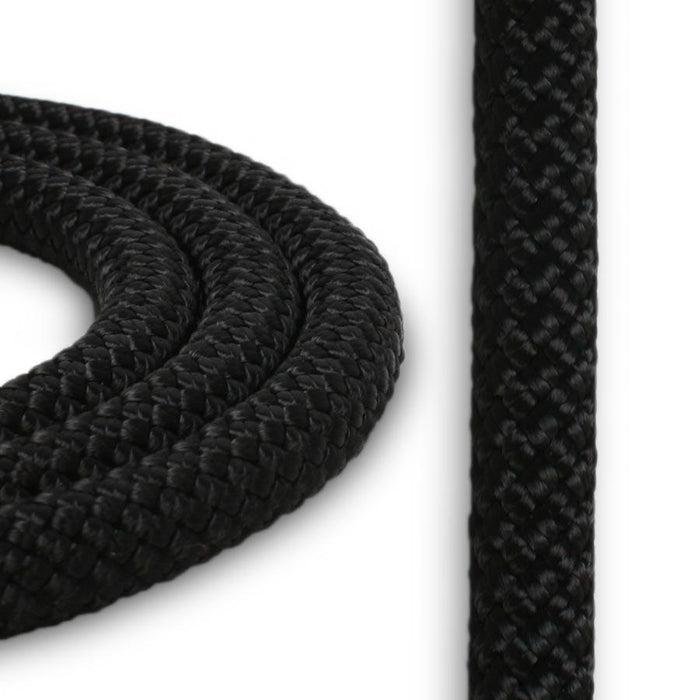
7/16 Diehard Static Rope - Black
Weight: 0.07 lb

A 32-strand polyester rappelling/ tower line with a softer construction compared to the KM III.
Also available in:
1/4" HERE
5/16" HERE
3/8" HERE
7/16" HERE
Wherever possible, use splices constructed to safe specifications. A proper splice on a rope can maintain 80% to 100% of the new rope average break strength. Trained personnel should construct all splices. If knots are used on a rope, be aware that they can reduce the rope's strength by up to 50%. If knots are required, be sure to select the proper knot for the job.
All rope has a rating referred to as a "tensile strength" or "average break strength." This number is the amount of weight that the rope should be able to hold in ideal conditions, specifically, a new rope, with no knots or splices, at room temperature. These break strength numbers are based on actual destructive break testing by the manufacturer or a certified third-party testing facility. Ropes are tested over many cycles and the average break strength is determined and specified for the product. We test our ropes personally, and all our splicers have their work tested on an ongoing basis using a certified test bed facility. This is to ensure that their splicing work is perfect, and that their splicing technique and skills are 100% within acceptable splicing guidelines set by the rope industry. Even the best splices and best rope can break if overloaded or used improperly. Make sure you thoroughly understand what you are doing with a rope. Get the right rope for the right job. If you have questions or are even remotely unsure or have doubts. STOP and get the information you need to BE SURE you are doing things safely.
Rope wear, knots, extreme hot or cold temperatures, chemicals, the manner in which the load is applied and other factors will result in a break strength lower than the stated average break strength.
A rope with a stated or advertised break strength, in pounds will not necessarily safely hold something that weighs that amount! Refer to the SAFE WORKING LOAD of a specific rope for more information.
IF IN DOUBT, ASK A PROFESSIONAL. We get calls all the time from people who have questions about what is the best rope to use for any given application. Don't be afraid to ask. Ultimately YOU are responsible for your safety using ANY rope, so don't chance it.
In a broad generalization, most working loads vary from 1/10 to 1/4 of the average break strength of the rope. Applications for rope used in life support or personal fall protection environments must use the 1/10 ratio.
In this video, we describe what static rope is, its characteristics and compare it to dynamic types of ropes.
HyperStatic is a tough-as-nails kernmantle static rope made of 100% high tenacity polyester. With high durability and low stretch, HyperStatic is b...
View full detailsHyperStatic is a tough-as-nails kernmantle static rope made of 100% high tenacity polyester. With high durability and low stretch, HyperStatic is b...
View full details"A 32-strand polyester rappelling/ tower line. A firm construction with a 8 strand polyester core make this rope great for rappelling and tower wor...
View full detailsFinish Line has 32-Strand Polyester Cover and an 8-Strand Parallel Polyester Core. It's a Low Stretch SRT Arborist Line with the Black and White Fi...
View full detailsSterling HTP is a fantastic Kernmantle static rope (almost zero stretch). Polyester jacket AND polyester core. Improved abrasion resistance compare...
View full detailsSterling HTP is a fantastic Kernmantle static rope (almost zero stretch). Polyester jacket AND polyester core. Improved abrasion resistance compare...
View full detailsSterling HTP is a fantastic Kernmantle static rope (almost zero stretch). Polyester jacket AND polyester core. Improved abrasion resistance compare...
View full detailsSterling HTP is a fantastic Kernmantle static rope (almost zero stretch). Polyester jacket AND polyester core. Improved abrasion resistance compare...
View full detailsSpecifically designed for tactical purposes, the Sterling OpLux line is the perfect option for saddle hunters. This smaller diameter line is lighte...
View full detailsThis 32-strand polyester rappelling/tower line is built with firm construction for exceptional abrasion resistance. Perfect for outdoor use, the po...
View full detailsA 32-strand polyester rappelling/ tower line with a softer construction compared to the KM III. 5/16" Diameter SRT climbing Rescue work Tower wo...
View full detailsA 32-strand polyester rappelling/ tower line with a softer construction compared to the KM III. 3/8" Diameter SRT climbing Rescue work Tower wor...
View full detailsA 32-strand polyester rappelling/ tower line with a softer construction compared to the KM III. 7/16" Diameter 6,075 lbs. Breaking Strength SRT ...
View full details